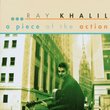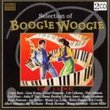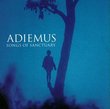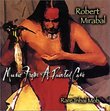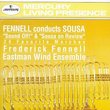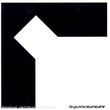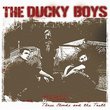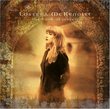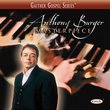| All Artists: Sir Charles Mackerras, Elisabeth Soderstrom, Lucia Popp, Eva Randova, Peter Dvorsky, Marie Mrazova, Wieslaw Ochman, Dalibor Jedlicka, Vienna State Opera Chorus Title: Janacek: Jenufa / Mackerras, Soderstrom, et al Members Wishing: 0 Total Copies: 0 Label: Decca Release Date: 9/10/2002 Album Type: Original recording reissued Genre: Classical Style: Opera & Classical Vocal Number of Discs: 2 SwapaCD Credits: 2 UPC: 028941448323 |
Search - Sir Charles Mackerras, Elisabeth Soderstrom, Lucia Popp :: Janacek: Jenufa / Mackerras, Soderstrom, et al
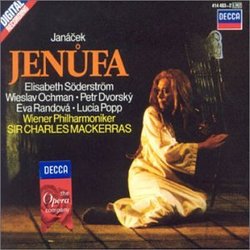 | Sir Charles Mackerras, Elisabeth Soderstrom, Lucia Popp Janacek: Jenufa / Mackerras, Soderstrom, et al Genre: Classical |
Larger Image |
CD DetailsSimilar CDsSimilarly Requested CDs
|
CD ReviewsGran Interpretación de una Opera maravillosa. Gustavo Chagoya Galaz | Monclova, México | 03/17/2003 (5 out of 5 stars) "Janacek compuso algunas de las mejores óperas del Siglo XX: Jenufa, Kata Kavanova, El Caso Makropulos, La Zorra Astuta y Desde la casa de los Muertos avalan este hecho. Jenufa es la primera de estas y la primera además en ser escrita en un estilo distintivamente individual - su primera obra maestra- y la primera en darle fama fuera de Checoslovaquia. Esta grabación es la primera en ofrecer la versión original de Janacek, ya que desde la segunda puesta en escena en Praga, la versión que había persistido fue la de Karel Kovarovic, de la cual puede escucharse la escena final en esta grabación. En esta grabación se puede escuchar la obertura original, que fue retirada después de 1908 y vuelta a interpretar como parte de la ópera hasta 1959: Zárlivost. Sir Charles Mackerras muestra el porque es el mejor exponente actual de la mùsica de Janacek, su interpretación está llena de detalles. El sonido como siempre es de lo mejor, tiene el sello distintivo de Decca: Gran balance, brillantez, fuerza en los graves y agudos claros, en fin una extraordinaria grabación. La interpretación es excelente: Elisabeth Söderström, canta en mi opinión estupendamente a pesar de varios críticos que opinan lo contrario, su interpretación llega a ser francamente conmovedora. Eva Randová soporta el otro papel importante: Kostelnika y su interpretación es excelente en mi opinión. Considero que ésta es la mejor grabación que existe en el mercado y el punto de referencia para las demás. Si alguien quiere introducirse en este gran compositor, ésta es la ópera más adecuada, la recomiendo ampliamente." One of the best operas of the 20th century Tomas Cvrcek | Central, SC, USA | 09/17/2004 (5 out of 5 stars) "This is really a brilliant opera. This is no belcanto, catchy-tunes, Verdi-style type of opera. It is a raw rural drama with sex, blood and deadly rage. There are several good things going for it: (i) Although the story is hair-raising at times (infanticide), it is entirely credible (no babies mistakenly thrown in the fire here, unlike in Verdi's Il Trovattore) - this opera's libretto was not ordered to be written from scratch, it was first a stage play before becoming a libretto. For that reason, it had to have a convincing internal logic to succeed first as a play. (ii) Janacek's music adds greatly to the story. The scene, in the third act, where the crime of infanticide is uncovered will send shivers down your spine. (iii) Janacek is very good in using folk music motives. The opera is set in Moravian countryside and the music shows it. Apparently, he could come up with such convincing folk-sounding tunes that many experts thought them to be genuine folk songs, only arranged for opera. (iv) The singing is good on this recoding. All the singers try hard to convey the emotion of their piece: they had to be very well acquaninted with the text - which is in Czech, an obscure language for many of the performers. (v) The accompanying booklet does a great job explaining the background of the opera. And explaining you will need - for understanding the personal interrelationships alone." One of the best Virgil Moojen | the Netherlands | 02/10/2004 (5 out of 5 stars) "Knowing this recording and reliving it in the theater (if it is a good performence) is one of those experiences one doesn't forget easily. Like Puccini, Janacek appeals to our hearts. The two principle women deserve all the credit. Söderstöm sounds very much as the young peasant girl deserted by her lover. Listening to Randova one hears that she is a great singing actress. The supporting roles are very well cast and one couldn't ask for a more dedicated chorus and orchestra under the baton of Mackerras. This one is hard to beat."
|

